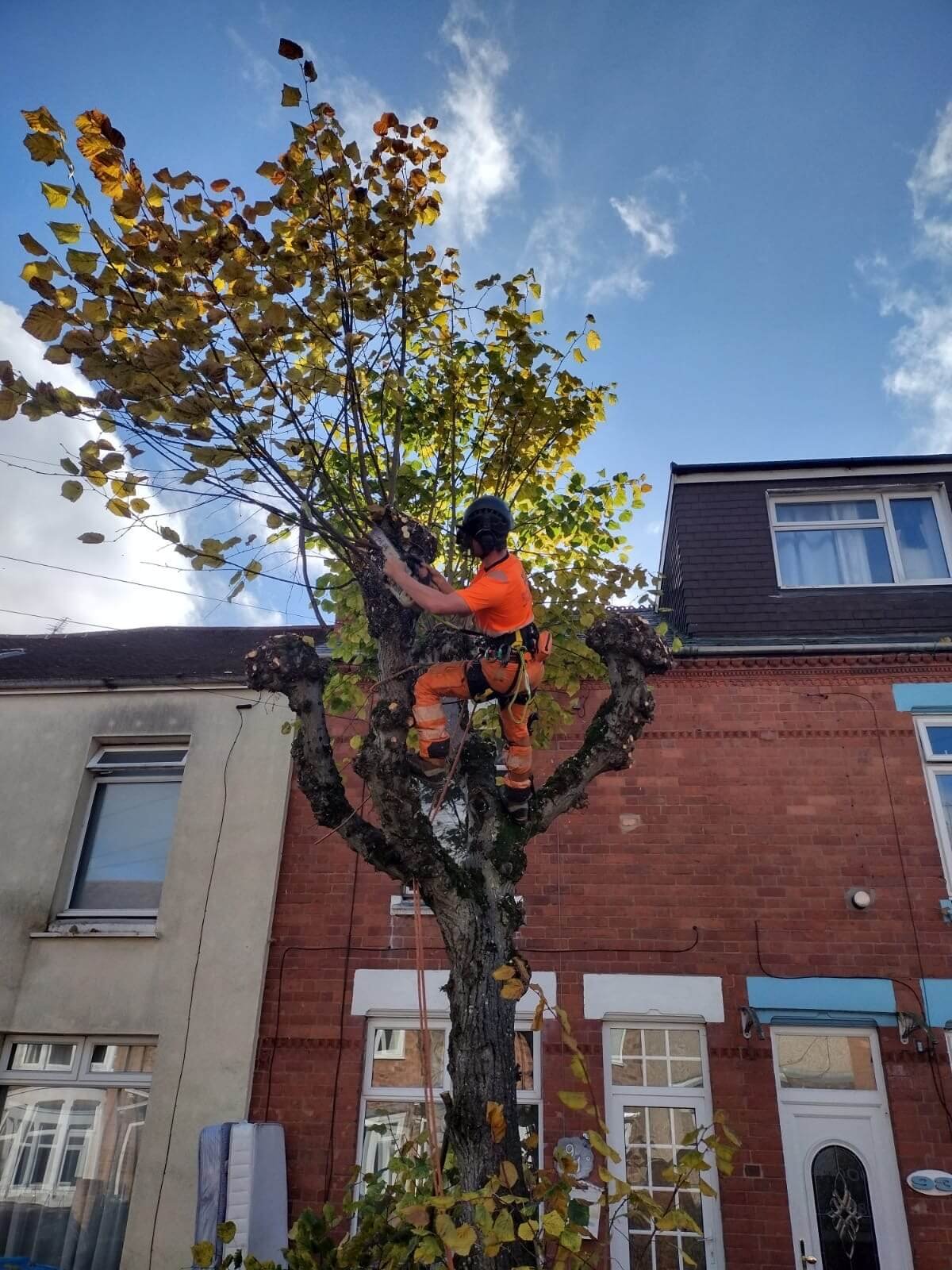A Guide to becoming an Arborist in the UK:
What is an Arborist?
An arborist, also known as a tree surgeon, is a professional dedicated to the cultivation, management, and study of individual trees, shrubs, vines, and other perennial woody plants.
They are responsible for maintaining tree health through pruning, planting, diagnosing diseases, and ensuring tree safety in various environments such as urban settings, parks, and private gardens.
Arborists utilise specialised equipment and techniques to manage trees, aiming to enhance their longevity and contribution to the ecosystem.
Their work is crucial for both aesthetic and environmental benefits. Arboriculture is a fulfilling and dynamic career choice for those passionate about trees and the environment.
As an expert in the field, Beechwood Trees and Landscapes Ltd. is here to guide you through the steps of becoming a professional arborist in the UK. Check out our careers page here.
One of our Tree Surgeon pruning a tree with a chainsaw.
Understanding the Role
Arborists are specialists in the care and management of trees. Their responsibilities include planting, maintaining, and diagnosing tree health issues.
Arborists work in various settings, from private gardens to public parks, ensuring the safety and health of trees and the surrounding environment.
An arborist's primary responsibilities include:
Tree Pruning and Trimming: Ensuring trees grow in a healthy and aesthetically pleasing manner.
Planting and Transplanting: Selecting the right tree species for specific environments and ensuring proper planting techniques.
Disease and Pest Management: Diagnosing and treating tree diseases and infestations.
Tree Removal: Safely removing dead or hazardous trees.
Risk Assessment: Evaluating the safety of trees in public and private spaces.
Consultation: Providing expert advice on tree care and management.
Education and Training
Educational Pathways:
GCSEs and A-Levels: Start with science subjects such as biology and geography.
Further Education: Consider a National Certificate (NC) or National Diploma (ND) in Arboriculture or a related field.
Higher Education:
Pursue a degree in Arboriculture, Forestry, or Environmental Science from a recognised university.
Alternatively, opt for a foundation degree or Higher National Diploma (HND) in Arboriculture.
Apprenticeships offer hands-on experience combined with classroom learning. Look for apprenticeship programs accredited by organisations
Certifications and Professional Development
Certifications:
Obtain certification from the Arboricultural Association, such as the Technician's Certificate in Arboriculture (TechCertArborA).
Consider international certifications like the International Society of Arboriculture (ISA) Certified Arborist credential.
Continuous Professional Development (CPD):
Engage in ongoing training and workshops to stay updated with the latest practices and technologies in arboriculture.
Team leader, left, and the rest of his team after completing pollarding.
Gaining Experience
Internships and Volunteering:
Gain practical experience through internships or volunteering with local councils, conservation groups, or tree care companies.
Employment:
Start your career as a ground worker or tree surgeon assistant to gain valuable field experience. Progress to more advanced roles as you acquire skills and certifications.
Essential Skills and Qualities
Technical Skills:
Proficiency in tree climbing, pruning, and use of arboricultural equipment.
Understanding of tree biology and soil science.
Personal Qualities:
Strong physical fitness and stamina.
Good communication and customer service skills.
Ability to work safely and follow regulations.
Tree Surgeon dismantling a tree after felling it.
Joining Professional Networks
Membership:
Join professional bodies such as the Arboricultural Association or the ISA to access resources, networking opportunities, and industry updates.
Career Opportunities
Diverse Roles:
Arborists can work in various roles, including municipal tree care, private consultancy, utility arboriculture, and conservation.
Advancement:
With experience and further education, advance to positions such as tree officer, arboricultural consultant, or business owner.
Conclusion
Choosing a career as an arborist in the UK requires a blend of education, practical experience, and continuous learning.
At Beechwood Trees and Landscapes Ltd, we are committed to supporting aspiring arborists in their journey. Whether you're starting with an apprenticeship or pursuing advanced certifications, the path to becoming an arborist is rewarding and impactful.
For more information and guidance, feel free to reach out to us or visit our website. Let's cultivate a greener future together! 🌳
Contact Us
Beechwood Trees and Landscapes Ltd.
Website
Email: info@beechwoodtrees.co.uk
Phone: 07976358219
Feel free to share your journey or ask any questions in the comments below!



